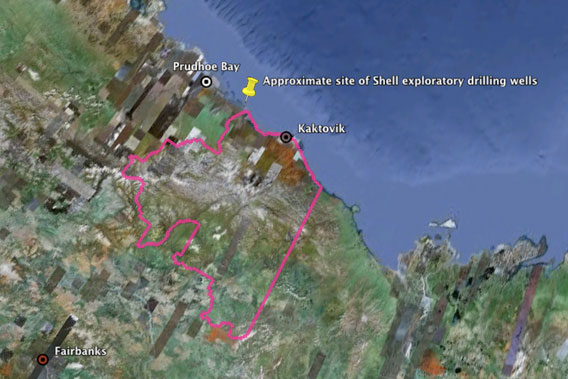
Approximate site of preliminarily approved drilling by Shell. Pink outline is the Arctic National Wildlife Refuge (ANWR). Image made with Google Earth.
Drilling in the Arctic waters of the U.S. may become as contested an issue as the Keystone Pipeline XL in up-coming months. Scientists, congress members, and ordinary Americans have all come out in large numbers against the Obama Administration’s leases for exploratory drilling in the Beaufort Sea and the Chuckchi Sea.
Last month 573 scientists signed a letter against opening the Arctic up to drilling until more research can be done in the sensitive area. In addition, a letter signed by 60 Congress members has been sent to Interior Secretary Ken Salazar noting that the Deepwater Horizon disaster occurred only two years ago. Finally, nearly half a million Americans (400,000) signed a petition against drilling in the Arctic. Critics of the Obama Administration’s leases say there is no coherent plan to clean-up a spill in the icy, remote Arctic ecosystem, which already embattled by climate change.
“The Arctic is the last wild ocean on the planet. Its waters and the abundant life they support are simply too sensitive to be drilled—especially since neither the oil industry nor scientists have identified a proven way to contain or clean up a spill in the Arctic’s extreme conditions,” Chuck Clusen, Alaska Project Director with the Natural Resources Defense Council, said in a press release. “At the very least, there should be no plan to lease these areas until key scientific studies have been done and until the oil and gas industry can demonstrate its ability to contain and clean up a spill.”
The letter from scientists asked the administration to “to follow through on its commitment to science” by following recommendations made by the United States Geological Survey (USGS) and refrain from drilling until more research can be done.
Still, drilling in the Arctic could begin as early as this summer by Royal Dutch Shell. The oil company argues that it has a meticulous oil-response plan even given the intense conditions of drilling in the Arctic, including response vessels standing by. Shell Alaska Vice President Pete Slaiby told the Associated Press that the company would be ready with a capping stack, similar to what was used to stop the Gulf oil spill in 2010 after the well leaked for three months.
Critics of Arctic drilling argue that given the extreme weather conditions, icy waters, and the remoteness of any oil well, it would currently be impossible to clean-up an oil spill adequately. Furthermore, clean-up efforts would almost certainly have to stop during the long Arctic winter. Currently the federal government is asking Shell to stop operations 38 days before the seasonal sea ice would arrive to make certain an oil spill doesn’t occur at the end of the season. Shell is trying to overturn this ruling.
“If the Obama administration were making its decision based on science rather than politics, drilling in the Arctic would be a nonstarter,” Rebecca Noblin, the Alaska Director with Center for Biological Diversity (CBD). “The Arctic Ocean is America’s last best wilderness. Launching massive industrial drilling operations risks America’s Arctic legacy for oil company profits.”
Last year Shell had the largest oil spill in the UK in a decade, while the oil giant also accepted responsibility for two massive oil spills in Nigeria in 2008 totaling 11 million gallons of crude. A thorough report from the United Nations Environment Program (UNEP) found widespread pollution devastating Nigerian people and ecosystems.
For his part, President Obama in the State of the Union address touted the fact that oil production in the U.S. was the highest its been in eight years. He also said his “directing my administration to open more than 75 percent of our potential offshore oil and gas resources.” The President furthermore noted that clean energy must still be apart of the U.S. energy mix, stating “I will not cede the wind or solar or battery industry to China or Germany.”
Despite Obama’s oil drilling push, gas prices remain high in the U.S. simply because further domestic production has miniscule impact on the global price of oil. Instead, environmentalists say, the only thing that will lower oil prices in the U.S. is to reduce dependency on oil altogether.
Related articles
Obama administration opens more of the Arctic to drilling
(10/05/2011) Nearly 500 Arctic oil and gas leases from the Bush administration have been restarted this week by the Obama administration. Known as Chukchi Lease 193, the various leases had been held up in court after environmental groups and indigenous groups challenged them, citing a significant lack of baseline information about the Chukchi Sea ecosystem. The Obama administration now says that many of the ecosystem gaps need not be filled, but Arctic indigenous and environmental groups disagree.
Deepwater spill ‘meets the Titanic’: groups sue to stop Arctic drilling
(09/29/2011) Following the Obama administration’s approval of Royal Dutch Shell to drill in the Arctic’s Beaufort Sea, a wide-swathe of environmental have filed a lawsuit to stop the drilling, which could begin as early as next summer. Those filing the lawsuit today blasted Shell for what they perceived as a pathetic oil spill response plan, and the Obama administration for acquiescing to the big oil company.
Shell spills over 50,000 gallons of oil off Scotland
(08/16/2011) Yesterday, Royal Dutch Shell estimated that to date 54,600 gallons of oil had spilled into the North Sea off the east coast of Scotland, spreading some 19 miles wide (30 kilometers) at its maximum. While the company stopped the initial leak on Thursday, it has now announced that the oil has found a ‘second pathway’ and is still leaking into the sea around 84 gallons a day.







